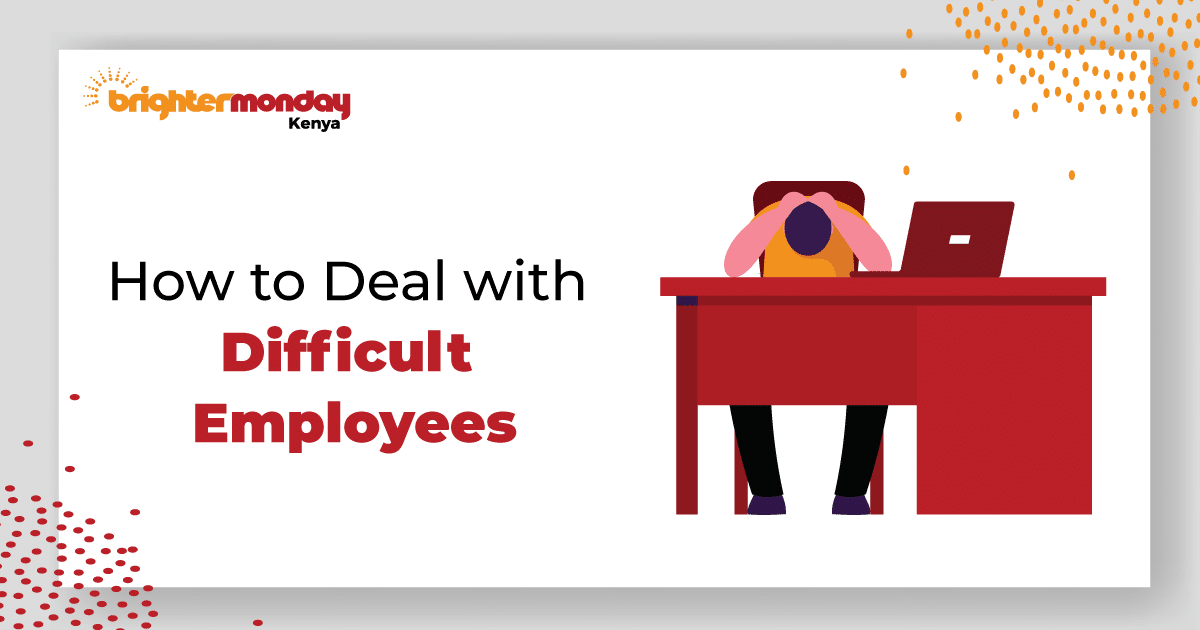No one starts off as a difficult employee at the workplace. In fact, everyone signs up for work with an aim to better both themselves and the job. However, at some point along the line – without proper management and collaboration – strain develops between managers and employees.
Most managers, when asked about the most difficult part of their jobs, are most likely to say something along the lines of ”managing difficult employees”. So how can this be dealt with to ensure the workplace is conducive enough for both parties?
Here are some tips on how to deal with difficult employees;
Table of Contents
Identify the Real Issue
Who is a ”difficult employee”? Is it the coworker who doesn’t listen to you? Is it the person who doesn’t deliver their work in time, despite having enough turnaround time? Or the worker whose manager has never understood what their career goals are, therefore constantly in a no-win situation?

You may ask, why would someone act out of place at the workplace, where they came looking for work? What is the real issue that drives them to act out and screw up things at work? Everyone has a reason why they would label someone a difficult coworker or employee. It is important to understand what might be the reason an employee acts the way they do – and if it is not towards developing company goals, a new approach should be taken. Sometimes the employee would just be happy – somewhere else.
Listen

Often, when an employee is difficult, the shift changes from what they do on a daily basis, to bouts of irritation and blame. A good manager should take some time to speak to the employee and understand why they feel frustrated at work. Difficult employees can make every coworker’s task harder, as they might not deliver on time.
As a manager, your best shot at understanding the problem and improving the situation is listening to the disgruntled employee. Look it from their point of view and figure out how to solve the issue at hand. You may find out that the issue is something beyond the employee’s fault, and they might be working to improve the situation themselves. When an employee feels heard, you may see an improvement in behaviour and better productivity.
Maintain a Stand on the Behaviour
Sometimes difficult employees may take advantage of a good manager’s stand on how they solve issues at work. When an employee reaches out during a difficult situation, offer constructive feedback and a helping hand if possible. If you are not okay with how an employee works on something, give strict guidelines that must be met to encourage a professional relationship.

If you are not okay with how the employee acts, don’t sometimes be okay with it. If for instance, you want the employee to submit an assignment at a certain, make sure the employee does it at that time. Make rules and stick to them. This means the employees also have to work within set timelines and maintains professional respect.
Encourage a Learning Environment
Managing difficult employees should not be just about the employees. Managers must ensure they are creating an environment that allows making mistakes and learning from them. This should not mean putting up with lazy behaviours or sloppy work, but ensures that employees understand the level of freedom they have.
Giving employees the field to explore not only reduces the chances of having to deal with difficult employees, it also fosters an environment that allows career growth and improvement.

Reiterate Company Policies
Difficult employees also know that there are certain company policies that they need to abide by at all times. Good managers hold on to the hope that there will be an improvement on the employees part before they finally decide to let them go. Set consequences for the employee and get specific with the changes you’d like to see.

For instance, say something like ”I still believe you can change this for the better. If you keep on with this behaviour by XXX date, here’s what will happen…” This means that if the employee hasn’t changed their actions by then, you already crossed all your T’s and dotted all your I’s. You can let go of this employee without repercussions on your end.
We hope these tips will make it easier for you to manage your employees at work.





